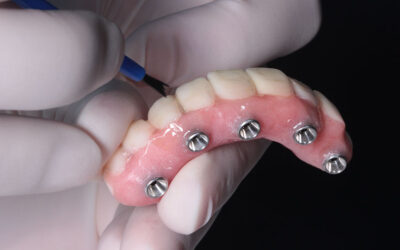Dental implants have the highest value of all the solutions for teeth that are missing or have become lost due to injury, infection, or disease. Ultimately, the goal of any procedure to replace missing teeth is to return you to normalcy: losing one or more teeth is traumatic, both as it happens and in terms of the effects of lost teeth on your overall oral health.
- Are you a Glen Ellyn, IL resident (or anyone in the Chicago area) who is struggling with missing teeth?
- Are you tired of the physical pain and stigma of missing teeth?
- Are you tired of treating your missing teeth with half-measures: dentures that slip and slide (and also require constant cleaning and maintenance), and dental bridges that must be frequently replaced and pose a risk of serious infection?
If you can answer “Yes” to any of these questions, you will want to learn more about dental implants. In our last post, we talked about how dental implants are the most valuable solution for teeth that are lost; dental implants are placed once and will last a lifetime, present no threat of infection, and require no more maintenance than your natural teeth. They also look better and work better than more conventional solutions.
What Is A Dental Implant? How Does It Work?
A dental implant replaces a missing tooth, or multiple teeth, permanently. This is possible because unlike bridges and dentures that require the support of either your teeth or oral tissues, a dental implant is surgically placed in your jawbone. Because dental implants require more intensive surgery than other solutions, you must be able to undergo general anesthesia to receive them. We’ll discuss later what makes a good candidate for dental implants; for now it suffices to say that not everyone can get them, due to complications arising from the condition of your oral and general health, and even lifestyle to an extent.
Depending on your situation, you may need a “traditional” dental implant, which is the basic type, or if you are missing multiple teeth or need a more specialized solution, more exotic implants such as All on Four implants(more on this later). Dental implants come in a variety of types and configurations, but they all generally follow the same basic design.
Dental implants are made up of three key components: the anchor, the abutment, and the crown.
The anchor is the “bottom” of the dental implant. It represents a post and is usually threaded like a screw or bolt (though some types of implant don’t have threading). The threading is how your dentist will apply the necessary mechanical force to the implant and ensure that it is solidly and firmly in place. You can think of the anchor almost as an artificial tooth root; it isn’t visible, and it is placed in your jawbone and beneath your gums.
Because of the function it performs and the environment in which it exists, it is necessary that the anchor be extremely strong, lightweight, and made of a biocompatible material (biocompatible materials are those that do not cause your body to react to their presence). Titanium fits all these requirements, and the majority of anchors are made of this metal.
The abutment is the piece that holds the whole implant together, linking the anchor to the crown. Abutment configurations vary, but usually they will employ a “screw-in” mechanism or a strong adhesive or cement.
Finally, the crown is the part of the visible part of the implant. It is designed to look as close in appearance to your natural teeth as possible, and is made of durable materials so that it can endure the impact and pressure of grinding and chewing food, as well as supporting the shape of the face and playing a role in keeping your jaws in proper alignment (all of which go away with teeth that are missing).
Can A Dental Implant Break or Fail?
Dental implants rarely break or fail. Implants are successful 95% of the time, provided no serious complications arise or injuries occur. When they do have problems, though, it is usually because the person who has the implant was not an ideal candidate to begin with.
Not everyone can get dental implants. Only by consulting your dentist will you know if you can have them and benefit from them. However, you can take a look at this brief overview of what your dentist considers when trying to determine if you can have dental implants placed.
Am I a Good Candidate for Dental Implants?
If you are interested in receiving dental implants, you must be:
- In good oral and general health
- Able to tolerate general anesthesia
- Be a grown adult
- A non-smoker (or at least making a serious effort to quit; smoking retards the healing process)
Of these criteria, the ones that people most struggle with are those that relate to your physical health.
Good General Health means that you are free of serious diseases. The diseases that can cause the worse complications are high blood pressure, Type II Diabetes, and autoimmune disorders. Just having these diseases doesn’t “disqualify” you from getting dental implants, but you will need to work with your dentist and other members of your healthcare team to understand the specifics of your problem; that is, what complications if any should be expected (and if they can be mitigated), and if you need to address these health issues before you can receive implants (if at all).
Good Oral Health is very problematic for many people seeking dental implants, because the most common reason teeth are lost is due to disease. Most frequently, that disease is periodontal, or gum disease. Gum disease, among other problems, can degrade your jaw’s bone density (which may also be reduced simply by missing the tooth). Dental implants depend on your jawbone to stay firmly in place and to work correctly. In fact, even though your implants will be firmly in place after your surgery, it will take up to a couple of months for them to become a permanent fixture. Because dental implants are biocompatible, they actually will merge with your jawbone as a part of healing, undergoing a process called osseointegration (if you’ve ever seen a tree grow around a foreign object, it’s the same principle).
If you have too little bone density, the implant stands a strong chance of failure. However, your dentist may be able to restore lost bone density with a bone graft (surgically placing a small amount of bone from one part of your body to your jaw). You may also have complications in your upper jaw, which can potentially be solved by a sinus lift.
Would You Like to Know if Dental Implants Are A Solution For You?
Then give us a call and make an appointment for a consultation! Only your dentist can tell you if you are in good enough health to receive dental implants; if you aren’t for whatever reason, your dentist can help you find the solution that will work best for you.
Call us at 630-858-8800 or click here to book your appointment now online.



